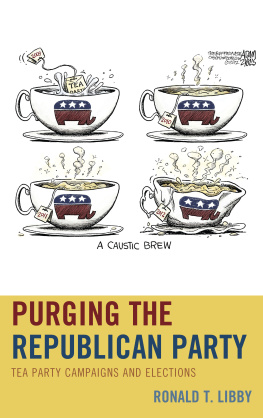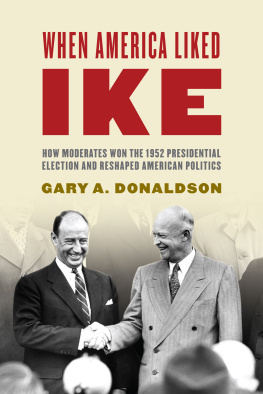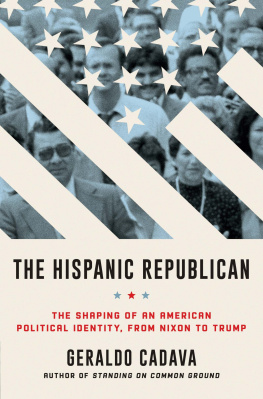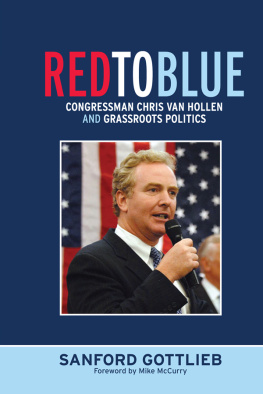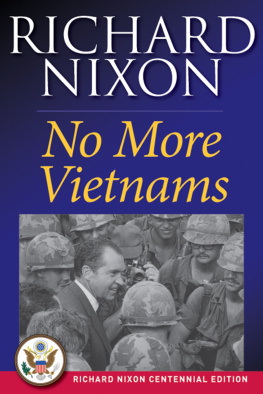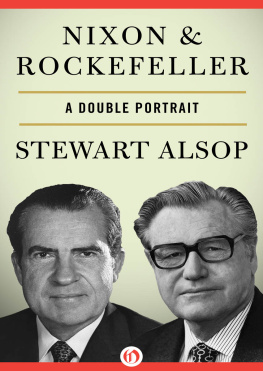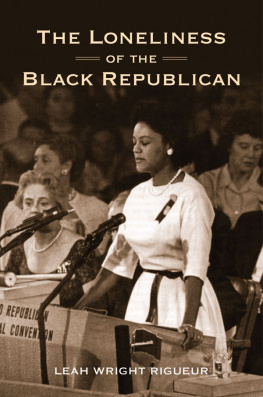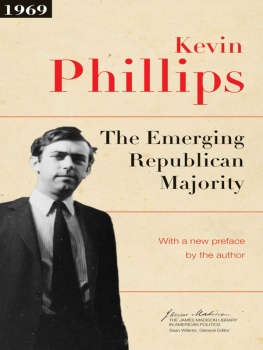Copyright 2010 by The University Press of Kentucky
Scholarly publisher for the Commonwealth,
serving Bellarmine University, Berea College, Centre College of Kentucky, Eastern
Kentucky University, The Filson Historical Society, Georgetown College,
Kentucky Historical Society, Kentucky State University, Morehead State University,
Murray State University, Northern Kentucky University, Transylvania University,
University of Kentucky, University of Louisville, and Western Kentucky University.
All rights reserved.
Editorial and Sales Offices: The University Press of Kentucky
663 South Limestone Street, Lexington, Kentucky 40508-4008
www.kentuckypress.com
14 13 12 11 10 5 4 3 2 1
Library of Congress Cataloging-in-Publication Data
Johns, Andrew L., 1968-
Vietnam's second front : domestic politics, the Republican Party, and the war / Andrew L. Johns.
p. cm.
Includes bibliographical references and index.
ISBN 978-0-8131-2572-5 (hardcover : alk. paper)
1. Vietnam War, 1961-1975United States. 2. Politics and warUnited StatesHistory20th century. 3. United StatesPolitics and government1961-1963. 4. United StatesPolitics and government1963-1969. 5. United StatesPolitics and government1969-1974. 6. Republican Party (U.S. : 1854-)History20th century. 7. Executive powerUnited StatesHistory20th century. 8. Legislative powerUnited StatesHistory20th century. I. Title.
DS558.J64 2010
959.704'31dc22 2009044739
This book is printed on acid-free recycled paper meeting
the requirements of the American National Standard
for Permanence in Paper for Printed Library Materials.
Manufactured in the United States of America.
Member of the Association of
American University Presses
Acknowledgments
George Orwell believed that writing a book is a long, exhausting struggle, like a long bout of some painful illness. One would never undertake such a thing if one were not driven by some demon whom one can neither resist nor understand. Most historians probably have similar feelings about their books at some point; I know I certainly did. But, overall, this has been a fascinating odyssey through one of the most intriguing and tragic periods in U.S. history.
It was not, however, a solitary journey. George Herring, David Anderson, David Schmitz, Walter Hixson, Jeff Livingston, David Kaiser, K. C. Johnson, Jeremi Suri, Laura Kalman, Jack Talbott, and Jim Matray all read various iterations and portions of the manuscript, provided excellent feedback and suggestions for improvement, and encouraged the project. Fred Logevall has been a tremendous adviser and friend. His scholarly expertise, constant support, and thoughtful advice on the book since its early stages have been invaluable. Tack s mycket. Valuable insights came from participating in the 2008 Society for Historians of American Foreign Relations Summer Institute program, directed by Peter Hahn and Bob McMahon; Jeff Engel, Matt Jacobs, Molly Wood, Chris Jespersen, Qiang Zhai, Tom Gaskin, Sandra Scanlon, Tom Zoumaris, Fabian Hillfrich, Michaela Hoenicke Moore, and Sayuri Shimizu all deserve credit for making me reconsider many of my arguments on the basis of their comments during the institute. Brian Etheridge, Terry Anderson, Kishore Gawande, Mark Stoler, Jessica Chapman, and Kyle Longley discussed the project with me when I visited their universities and gave me a great deal to think about, as did Tom Schwartz, Chester Pach, Andrew Preston, Tom Zeiler, Kurk Dorsey, Bill Miscamble, Andy Fry, Bob Schulzinger, Andrew Johnston, Hang Nguyen, Mitch Lerner, Jim Siekmeier, John Prados, and Bob Brigham in other venues.
A special thanks goes out to my three closest friends in the professionKen Osgood, Jason Parker, and Kathryn Statler. The past fifteen years of research trips to isolated archives, seminars, spilled coffee, barbeques, conferences, baseball and football games, and frequently making fools of ourselves would not have been the same without you. Ken and Jason read multiple drafts, gave cogent advice, justifiably ridiculed some of my more pathetic titles and ideas, inspired with their book prizes, entertained with their antics, and (maybe most important) threatened me if I didn't get finished. Kathryn read the entire manuscript at least twice, pushed me to get done, and provided indispensable advice and supportand administered a swift slap to the head when necessary.
Many others made helped make the book a reality. Chase Michaels, Lou Phillips, and the boys helped keep me marginally sane and solvent, and the WTFL and End Zone Maniacs gave me welcome diversions (and more cash). I couldn't ask for a more collegial environment than the one I enjoy at Brigham Young University. The institutional support for faculty research and writing is unsurpassed, and my colleagues have been fantastic. Particular thanks go out to Rebecca de Schweinitz, Chris Hodson, Matt Mason, Shawn Miller, Julie Radle, Aaron Skabelund, and Neil York for their support and lending an ear to my frequent ranting. My former colleague Brett Rushforth (now at William and Mary) furnished incentive to get the book finished during my leaveeven if we didn't quite make our deadlines, I think I won. The Santa Barbara mafiaJake Hamblin, Hubert Dubrulle, Rick Fogarty, Dennis Ventry, Justin Stephens, Kimber Quinney, Jennifer See, Jennifer Stevens, Lisa Larson, Traci Heitschmidt, and John Sbardellatidid its part as well. Curtis Solberg, Toshi Hasegawa, Tom Maddox, Matthew Jaffe, and Kevin Chambers helped keep me in touch with academe during the dark years. Finally, thanks to Julie Harris Adams, Michael Adamson, Jennifer Baker, Dan Combs, Sophie Hill, and Russell Stevenson for their research assistance.
Given the nature of my research, this book would not have been possible without generous financial support from multiple sources, including the Society for Historians of American Foreign Relations; the Organization of American Historians; the Historical Society of Southern California and the John Randolph Haynes and Dora Haynes Foundation; Sun West Endodontics; the American Foreign Policy Center; the Rockefeller Archive Center; the Carl Albert Congressional Research and Studies Center; the Herbert Hoover Presidential Library Association; the Dirksen Congressional Center and Caterpillar Foundation; the George Bush Presidential Library Foundation; the Bentley Historical Library; the Lyndon Baines Johnson Foundation; the Department of History and Graduate Division at the University of California, Santa Barbara; the Minnesota Historical Society; the Gerald R. Ford Foundation; the Regents of the University of California; the Interdisciplinary Humanities Center, the Graduate Division, and Department of History at the University of California, Santa Barbara; the David M. Kennedy Center for International Studies; and the Department of History, College of Family, Home and Social Sciences, and College of Undergraduate Education at Brigham Young University. I would also like to thank the Herb Block Foundation for its generosity.
Conducting research is a time-consuming process, particularly when dealing with material scattered in dozens of repositories across the United States. While there are far too many people to thank individually (lest I neglect to mention someone at one of the nearly forty archives in which I worked), I am indebted to the archivists and staffs at the presidential libraries, congressional collections, historical societies, and university special collections and libraries cited in the book for providing invaluable guidance to the vast documentation and wildly divergent organizational systems. Their collective expertise made the research portion of this project much more efficient and productive. I would also like to thank the legal representatives of the family of Senator Wallace F. Bennett (R-UT) for granting access to his papers. I should also acknowledge the creators and maintainers of the Biographical Directory of the United States Congress (http://bioguide.congress.gov/biosearch/biosearch.asp), an invaluable resource for scholars working in congressional archives and collections.


